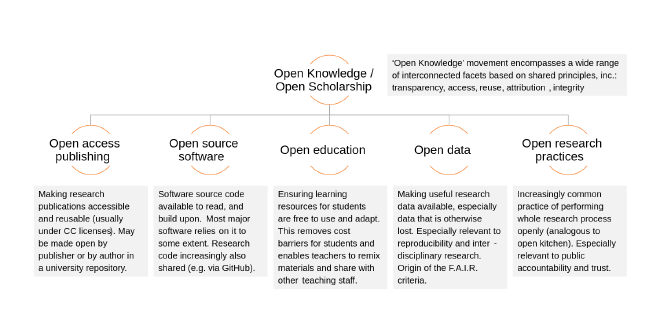Open Knowledge: A Broader View on the Concept of Openness

Despite our concern with issues related to open-source software, the concept of “openness” encompasses much more than the realm of software. Movements advocating for open science, open data, open research, and open access are all as important as open-source software for those concerned with freedom, transparency, and quality.

Open knowledge includes all of these concepts (including open-source), and more. As the concept is largely broad, a comprehensive treatment of the topic in a single post is not feasible; we hope, however, that this acts as an introductory general overview that drives the curious reader to learn more and carry out their own research on the topic.
Central to the term “open knowledge” is the concept of “openness” which the Open Knowledge Foundation gives a definition for that is in the spirit of the Open-Source Definition. The foundation released a document called the Open Definition which it summarizes with this statement:
Open means anyone can freely access, use, modify, and share for any purpose (subject, at most, to requirements that preserve provenance and openness)
Although the term “open knowledge” is relatively new, the concept itself is by no means new. One of the earliest examples we have can be traced back more than a thousand years ago, which is a printed copy of a Buddhist religious text produced in China around 868 AD that contains a dedication for “universal free distribution”. Another example is the 1772 French encyclopedia written by Denis Diderot, who allowed reuse of his work in return for him having material from other authors.
One area of open knowledge is open research, which allows the public to access new, cutting-edge research and allows researchers to collaborate and work together.
Arxiv is a great platform for finding open research papers in multiple fields. Other digital libraries that restrict access to research papers, such as JSTOR, also provide open access to some of their papers. Despite this, open research advocates still point out some issues related to open research; these include the lack of open-notebook and open-peer review research. Open-notebook research calls for researchers to openly release their process while working on a research project, providing their “notebooks” and their trial-and-error process publicly; his includes the failed hypotheses they come up with during the research process and code they write. Open-peer review calls for journals to specify the peer reviewers of a research paper.
Another major area of open knowledge is open educational resources (OER).
The UNESCO defines OER as:
teaching, learning and research materials that make use of appropriate tools, such as open licensing, to permit their free reuse, continuous improvement and repurposing by others for educational purposes.
OER include various resources including open textbooks, open courses, open course, materials, open streaming videos, open tests, and open-source software. OER permit everyone to freely engage with the 5R activities, which are:
- Retain: The right to make copies of the content;
- Reuse: The right to use the content in different contexts (for example, in study groups or in class);
- Revise: The right to modify the content itself;
- Remix: The right to use the content with other materials to produce something new; and
- Redistribute: The right to share copies of the content, exact or modified, with others.
Many institutions are now contributing towards OER. Examples include MIT’s OpenCourseWare, which offers more than 2400 courses openly, and online courses provided by universities such Harvard and Stanford. A growing number of educators are now in favor of publishing their lectures online.
As for open textbooks, some authors publish their books online to the public domain; some remarkable examples are:
- Operating Systems: Three Easy Pieces
- The Linux Command Line
- Automating the Boring Stuff with Python
- Speech and Language Processing
Some websites offer a collection of open textbooks such as the Open Textbook Library, sponsored by the University of Minnesota, which provides a huge library of open textbooks in different fields such as medicine, law, and computer science; and LibreTexts Mathematics which offers a huge library of open mathematics textbooks.
In conclusion, the concepts of open knowledge and openness are huge and broad ones, and here we barely manage to scratch the surface. We strongly recommend those interested to carry out more research and to help contribute to open knowledge by sharing knowledge and content openly and freely for the public domain.
Recommended reading: